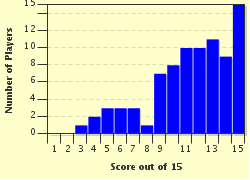Quiz Answer Key and Fun Facts
1. "It's a Long Way to Tipperary" was popular with both Americans and British during World War One. But exactly where is Tipperary?
2. In 1943-44 the Mills Brothers had a song that dominated the radio and sales charts. It was one of the first songs to reach ten million copies sold. Actually, it was written in 1915 by John Black. It told the story of a man who distrusted "real life girl(s)". What was the name of the song?
3. Many songs of the era were purely propaganda and intended to foster a deep sense of patriotism. This song written in 1917 by George M. Cohan was not only popular during the First World War but in the Second as well. What was Cohan's contribution? (Hint: Where is the enemy?)
4. One of the light-hearted songs was "How Ya Goin' to Keep'em Down on the Farm", which expressed concern about how unsophisticated American soldiers might be spoiled by what city?
5. "Roses of Picardy"(1916) was a popular WWI song. Just where is Picardy?
6. "If You Were the Only Girl In the World"(1916) has been recorded by many artists through the years and used in many film and television productions. In which of these was it NOT used? Hint:No Angels
7. This song was written in 1917. On the sheet music it said "The Sensational Stammering Song Success Sung by the Soldiers and Sailors". What song was this?
8. This popular WWI song urged the folks back home to do what with their fires?
9. "Old Gallipoli's A Wonderful Place" has these lines:
"Send out steak and onions and nice ham and eggs
And a fine big fat chicken with five or six legs,
And a drink of the stuff that begins with a "B"
Where the old Gallipoli sweeps down to the sea."
During World War One what nation(s) would be most closely associated with Gallipoli?
10. Soldiers need marching songs to ease the drudgery of long treks. This one was set to traditional music and the lyrics were anonymous. For the most part the words were risque by early 1900 standards. Each verse contained two elements--"parlez-vous" and "Inky dinky". What was the name of this World War One marching song?
11. Another World War marching song advised you to "Pack Up Your Troubles in Your Old Kit Bag" and do what?
12. "Jaan Kenbrovin" is given credit for writing this rather sentimental and memorable song "I'm Forever Blowing Bubbles". Who was Jaan Kenbrovin?
13. Striking a similar tone as "I'm Forever Blowing Bubbles" is this song from 1917 called "I'm Always Chasing Rainbows". Harry Carroll and Joseph McCarthy are credited with the song but in reality the melody was adapted from what classical composer? (Hint: think Poland)
14. "The World Is Waiting for the Sunrise" (1919) came late in the World War One era but it expressed the optimism for recovery from what was then the bloodiest war in recorded history. Gene Lockhart wrote the lyrics from a melody by Ernest Seitz. Why was Seitz reluctant to have his name on the composition?
15. "I Didn't Raise My Boy to Be a Soldier" was an anti-war song written by Alfred Bryan and Al Piantadosi in 1914. The sentiment of this song was strongly attacked by many. Which of these was NOT a reason?
Source: Author
Rehaberpro
This quiz was reviewed by FunTrivia editor
agony before going online.
Any errors found in FunTrivia content are routinely corrected through our feedback system.


